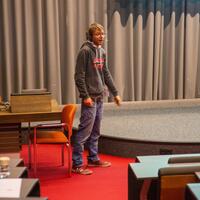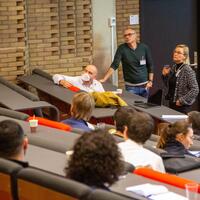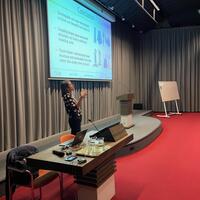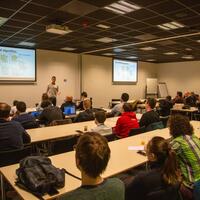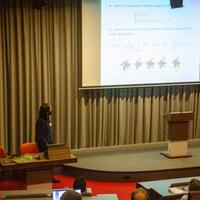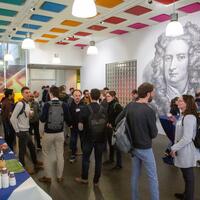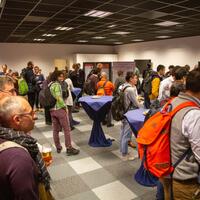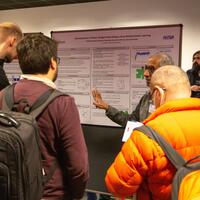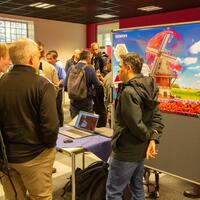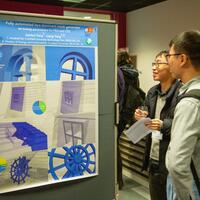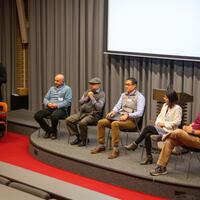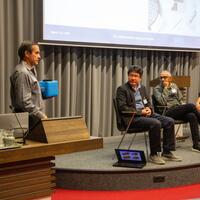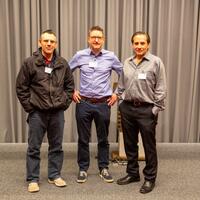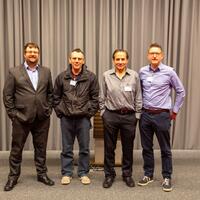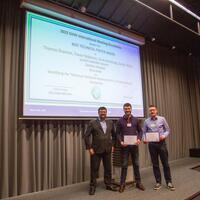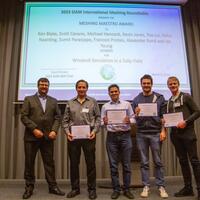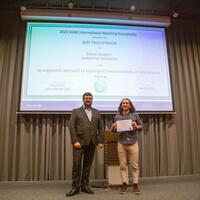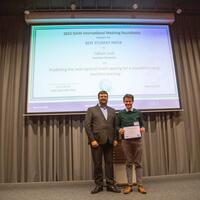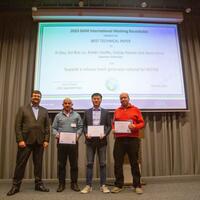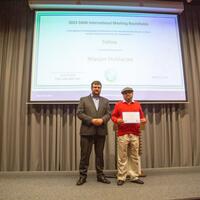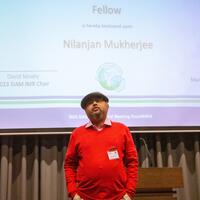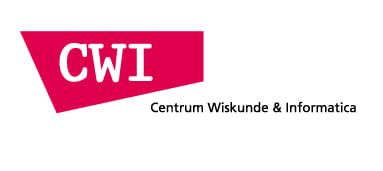Please consider filling out our short attendee survey to help for future years!
This page contains additional information and resources for attendees:
NOTE: The uploaded research notes, posters and meshing maestro entries have been reduced in resolution in order to conserve bandwidth.
Research notes
The SIAM IMR23 research notes can be found below:
- Octupoles for octahedral symmetry
Nesterenko. - A data-driven proactive mesh refinement framework for computational fluid
xdynamics simulations in converging-diverging
nozzles
Lee, Roh, Kim. - Region selective subdivision of Intrinsic meshes
Suriyababu, Vuik, Möller. - Towards an Automated Mesh Smoother for High-Order Meshes: Representing the Boundary by a Level Set Function
Dobrev, Knupp, Kolev, Mittal, Tomov. - Accelerating High-Order Mesh Optimization: Metric Linearization and Partial Assembly
Mittal. - Identifying the Minimum Meshable Representation in Turbomachinery Geometries
Shannon, Robinson, Armstrong, Nolanm, Kalwak. - Structured, higher-order, hexahedral mesh generation of vascular networks
Bošnjak, Fries - Surface remeshing based on conformal uniformization
Si, Lei, Gu. - Surface cross field generation based on characteristic class of fiber bundle
Luo, Zhu, Zheng, Lei, Si, Gu. - Adaptive Meshing in the Particle Finite Element Method
Leyssens, Lambrechts, Remacle. - An ergonomic approach to topological transformations of unstructured meshes Shapero.
- Limits and prospects of polycube labelings
Mestrallet, Protais, Bourcier, Ledoux. - An actuator disc level set model for wind farm mesh generation and adaptation
Gargallo-Peiró, Revilla, Avila, Fernández-Méndez, Houzeaux. - Preparing non-conforming meshes of B-rep NURBS for DG-BEM simulations
Ali, Marussig. - A Penalty Based Genetic Algorithm for Mesh Optimization of 2D Non-convex Polygons
Gouveia, Guedes, Ruben. - A Tensor Formulation for Integrable Frame Fields
Couplet, Chemin, Remacle. - t8code v. 1.0 - Modular Adaptive Mesh Refinement in the Exascale Era
Holke, Burstedde, Knapp, Dreyer, Elsweijer, Ünlü, Markert, Lilikakis, Böing, Ponnusamy, Basermann. - Quadcover for large deormation simulation
Desobry, Pellerin, Ray, Sokolov. - Maintaining 2D Delaunay triangulations on the GPU for proximity queries of moving points
Porro, Crespin, Hitschfeld, Navarro, Carter. - An initial refinement is unnecessary for a linear conforming closure of the refinement by newest vertex bisection
Gehring. - Optimizing high-order tet meshes for smoothed particle hydrodynamics setup with the target matrix optimization
Nissen, Stees, Owen, Owen. - Isogeometric boundary-conforming body-in-white crash model construction, analysis and comparison with FEM model
Shepherd, Gu, Hughes.
Technical posters
- Block-Structured Quad Meshing for Supersonic Flow Simulations
Roche, Ledoux, Breil, Hocquellet. - Surface and Hypersurface Meshing Techniques for Space-Time Finite Element Methods
Anderson, Williams, Corrigan. - Block structured mesh using a system of coordinated reflex agents
Postat, Ledoux, Hutzler. - Decomposition of Planar, Straight-sided Shapes using Reinforcement Learning
Cardona, Ray, DiPrete, Garimella. - Identifying the “Minimum Meshable Representation” in Turbomachinery Geometries
Shannon, Robinson, Armstrong, Nolan, Kalwak.
Meshing maestro entries
- Fully automated hex-dominant mesh generator no tuning parameters for FEA and CFD
Yang, Yang. - ViZiR 4: visualization of high-order meshes and solutions software
Maunoury, Loseille. - Windmill Simulation in a Tulip Field
Blake, Canann, Hancock, Jones, Liu, Naarding, Paranjape, Protais, Rand, Young. - Windmillception - Exascale-Ready Adaptive Mesh Refinement
Elsweijer, Holke, Knapp. - IMR 2023 meshing contest submission - Cadence Design Systems
Besem-Cordova, Karman-Shoemake, Teixeira, Delsate, Bonaccorsi.
Short courses
Slides and material from the short courses on Monday 6th March can be accessed here.
Practical information
Registration
You can register at the conference each day starting from 8am. Registration is directly at the entrance to the conference venue. All attendees will receive a registration badge, which you are kindly requested to visibly carry during the conference. Please visit the registration desk if your badge is lost.
Program
In keeping with previous IMRs, Monday’s program consists of short courses, and Tuesday sees the start of the main program of talks, posters and other sessions. You can find more information on the program on the program page.
Food and beverages
All break sessions, including tea/coffee breaks and lunches, are listed on the conference program.
Rooms
The congress centre has three rooms all accessible from the lobby. Most sessions are in the main Turing Room, with other talks occurring in the Euler Room. Refreshments will be served in the Newton Room.
Internet access
Access to the internet is available for all attendees, either via the eduroam service, or by connecting directly to the guest access point named Amsterdam Science Park.
Instructions for speakers
If you are presenting at the IMR, please note that paper talks are 20 minutes, and research notes are 10 minutes. Both talks have 5 minutes for questions. Research note talks will be presented in parallel sessions.
We anticipate that most presenters will wish to use their own computers for presenting. Each room has HDMI and VGA connections. Presenters are encouraged to test their talks and introduce themselves to the chair of their session during breaks. Should you have issues with your AV, please speak to the session chair.
Instructions for poster presenters
The poster presentation session will be on Tuesday 7th March between 6-8pm. Poster presenters are requested to drop off their posters at the registration desk by 8:40am on Tuesday 7th March.
If you have any questions, please find us at the registration desk, or contact the conference or local organising committee chairs whose details are available on the IMR website.
